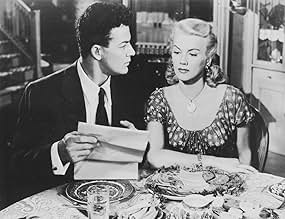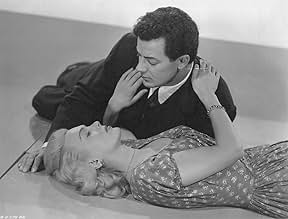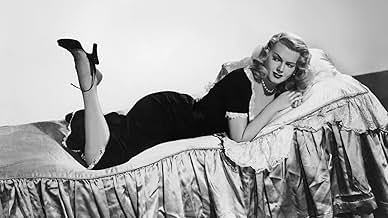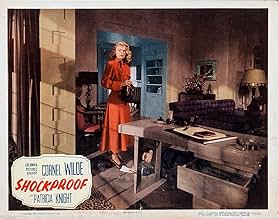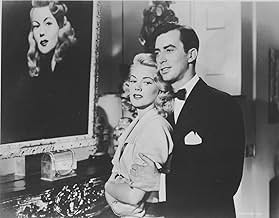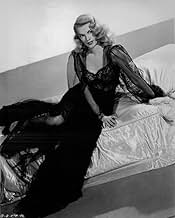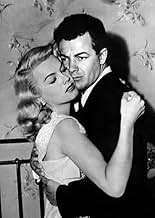IMDb-BEWERTUNG
6,5/10
2720
IHRE BEWERTUNG
Füge eine Handlung in deiner Sprache hinzuA parole officer falls in love with his client, a ravishing blonde who served time for murder, and he's determined to help her go straight despite her interfering criminal boyfriend.A parole officer falls in love with his client, a ravishing blonde who served time for murder, and he's determined to help her go straight despite her interfering criminal boyfriend.A parole officer falls in love with his client, a ravishing blonde who served time for murder, and he's determined to help her go straight despite her interfering criminal boyfriend.
- Regie
- Drehbuch
- Hauptbesetzung
Shirley Adams
- Emmy
- (Nicht genannt)
Gilbert Barnett
- Barry
- (Nicht genannt)
Richard Benedict
- 'Kid' - Knife Wielder
- (Nicht genannt)
Paul Bradley
- Airline Clerk
- (Nicht genannt)
Argentina Brunetti
- Stella
- (Nicht genannt)
Paul Bryar
- Man in Car
- (Nicht genannt)
John Butler
- Sam Green, Pawnbroker
- (Nicht genannt)
Claire Carleton
- Florrie Kobiski
- (Nicht genannt)
Cliff Clark
- Mac - Police Lieutenant
- (Nicht genannt)
King Donovan
- Joe Wilson
- (Nicht genannt)
Al Eben
- Joe Kobiski
- (Nicht genannt)
Empfohlene Bewertungen
"Shockproof" is a 1949 Douglas Sirk film starring Cornel Wilde and Patricia Knight. Wilde is Griff Marat, who gets a paroled prisoner, Jenny Marsh (Knight) on his caseload. She refuses to give up the bad acquaintances that got her into trouble in the first place; this includes her old boyfriend, Harry (John Baragrey) whom she continues to meet secretly. Griff has taken Jenny into his home to care for his blind mother (Esther Minciotti), and over time, they fall in love. Though she's still pulled toward Harry, she balks when Harry wants her to convince Griff to marry her, a clear violation of his job ethics and her parole. Because Griff has political ambitions, they will then have them where they want him. Gradually Harry realizes that Jenny is not going to cooperate, and he ends up gravely injured. Griff and Jenny go on the run to avoid her arrest.
This is a pretty good noir with two heavyweights attached, Sirk, the director, and Sam Fuller, who co-wrote the script. Unfortunately, the characters aren't fleshed out enough so that we understand their sudden turnarounds - a man on the side of the law with political ambitions decides to throw it all out the window, marry a client secretly, and go on the run riding in boxcars and living in shacks because though the shooting was accidental, Griff feels Jenny won't be believed. That's just Griff - in reality, all three of the main characters do complete reversals during the course of this film with little or no justification.
Wilde does a good job here, and Knight, a new actress to me, is beautiful and has good chemistry opposite her then husband Wilde. She didn't work much longer, as after their divorce, her career dried up.
Entertaining.
This is a pretty good noir with two heavyweights attached, Sirk, the director, and Sam Fuller, who co-wrote the script. Unfortunately, the characters aren't fleshed out enough so that we understand their sudden turnarounds - a man on the side of the law with political ambitions decides to throw it all out the window, marry a client secretly, and go on the run riding in boxcars and living in shacks because though the shooting was accidental, Griff feels Jenny won't be believed. That's just Griff - in reality, all three of the main characters do complete reversals during the course of this film with little or no justification.
Wilde does a good job here, and Knight, a new actress to me, is beautiful and has good chemistry opposite her then husband Wilde. She didn't work much longer, as after their divorce, her career dried up.
Entertaining.
They say it's the journey, not the destination, that usually counts with stories. In the case of Shockproof it's good to just focus on the journey, in all its B-movie-ness and, yes since it is Douglas Sirk, melodrama, because the destination kind of stinks. The film's story concerns a beautiful blonde parolee played by Patricia Knight who is put into the watchful eye and soon enough loving arms of her parole officer, Cornell Wilde. She's been wanting to get back together with her former lover, a gambler-hustler named Harry Wesson, who by the look of the guy is sleazy but perhaps not too bad a shake for a 'dame' like Knight plays. But the parole officer wants a better life for her, and that she knows it too. Soon she does, after some persistence, fall for Griff, but at a price when another character gets (preumably) murdered after a gunshot.
It becomes a lovers-on-the-run story, and, not to quote Harry's own line about the melodrama I mention above, this twist does bring some melodrama with it as the characters try to evade the law, cross into Mexico, go back into the states and Griff becomes an oil-drill worker. But the main problem of being on the lam catches up to them, and finally a decision is made. It's around here, in just the last few minutes, that the film really crumbles into predictability (and, to be fair, it wasn't Fuller's idea as the producer rewrote the script before filming). The acting and the script up until that point, however, does deliver on the promise of a simple premise. There's nothing terribly special about the story, but it works on its own terms as a tale of a love-triangle gone awry. We know the situation might be different if a character did something smarter, or did something more drastic or if, say, Harry went more into an actual criminal role and just ran off with Jenny to start with after she got out of prison.
But as it stands the performances are just fine- even the one-note crooning of the blind mother of Griff's who knows what she knows even without seeing, a real Fuller caricature if I ever saw one- and when it comes off like a real film-noir, with edge and believability, both of the legends Sirk and Fuller can get credit. It's no great shakes, but it passes 80 minutes by with some rich emotions and a, with a few exceptions in some scenes, solid dramatic turns and directions made by the characters.
It becomes a lovers-on-the-run story, and, not to quote Harry's own line about the melodrama I mention above, this twist does bring some melodrama with it as the characters try to evade the law, cross into Mexico, go back into the states and Griff becomes an oil-drill worker. But the main problem of being on the lam catches up to them, and finally a decision is made. It's around here, in just the last few minutes, that the film really crumbles into predictability (and, to be fair, it wasn't Fuller's idea as the producer rewrote the script before filming). The acting and the script up until that point, however, does deliver on the promise of a simple premise. There's nothing terribly special about the story, but it works on its own terms as a tale of a love-triangle gone awry. We know the situation might be different if a character did something smarter, or did something more drastic or if, say, Harry went more into an actual criminal role and just ran off with Jenny to start with after she got out of prison.
But as it stands the performances are just fine- even the one-note crooning of the blind mother of Griff's who knows what she knows even without seeing, a real Fuller caricature if I ever saw one- and when it comes off like a real film-noir, with edge and believability, both of the legends Sirk and Fuller can get credit. It's no great shakes, but it passes 80 minutes by with some rich emotions and a, with a few exceptions in some scenes, solid dramatic turns and directions made by the characters.
A parole officer falls for one of his charges, but is she playing him for a sucker? Not so much a noir as a noir-esque romantic melodrama, and not up to the level of the best from either director Douglas Sirk or writer Sam Fuller. The story could have gone one of two ways, and it chose the less interesting path (from what I've read, this might have been a studio decision). However, Cornel Wilde and Patricia Knight (actual spouses at the time) handle their performances quite well, and play off each other with conviction and chemistry. The script has some nice touches, the photography is pretty sharp, and the supporting roles are good. It's certainly a watchable movie, just rather bland... and it wraps up far too easily.
Enjoyed this film a great deal because I always liked Cornel Wilde, (Griff Marat) who plays the role as a parole officer and he has to deal with a very attractive gal named Jenny Marsh, (Patricia Knight) who spent five years in prison for taking the rap for murder which she did for her lover Harry Wesson, (John Baragrey). Griff tells Jenny she cannot have anything to do with her boyfriend Harry and he also put many restrictions on her because she is on parole for life. Griff begins to take a liking to Jenny but she fights him off and wants to always go back to her lover. This story takes on many twists and turns which holds your interest and I was very surprised that the hairstyle and clothes that Patricia Knight wore would even look great today, she gave a great performance.
Patricia Knight has just been paroled. Her parole officer is Cornell Wilde. He reads off the list of restrictions which she has already memorized. She almost immediately breaks them when she sees her former lover, gambler John Baragrey in a bookie shop, but Wilde gives her another chance. She loses her job, so her takes her into his home to take care of his blind mother. Soon they are in love. She goes to Baragrey's apartment to tell him goodbye. He calls Wilde at the office to tell him she's breaking parole and playing him for a sucker, so she shoots him. And she and Wilde go on the run.
Douglas Sirk directs with lots of fine location shooting, including the essential-for-noir Bradbury Building. He agreed to shoot this one after reading Samuel Fuller's original story, even though Columbia put in a cop-out ending that frustrated Wilde's character arc, from a straight-arrow fellow with political ambition to a criminal on the run. His real-life wife, Patricia Knight, gives a fine, guarded performance; you never know what she's really thinking or going to do next. Her movie career did not survive her divorce from Wilde. She died in 2004, age 89.
Douglas Sirk directs with lots of fine location shooting, including the essential-for-noir Bradbury Building. He agreed to shoot this one after reading Samuel Fuller's original story, even though Columbia put in a cop-out ending that frustrated Wilde's character arc, from a straight-arrow fellow with political ambition to a criminal on the run. His real-life wife, Patricia Knight, gives a fine, guarded performance; you never know what she's really thinking or going to do next. Her movie career did not survive her divorce from Wilde. She died in 2004, age 89.
Wusstest du schon
- WissenswertesThis film features the iconic Bradbury Building at 304 S. Broadway as the location of Griff Marat's office. Out of his office window can be seen the old Hall of Records Building at 220 N. Broadway (demolished 1973), which is about 0.4 miles away.
- PatzerWhen Sam Brooks comes into Griff's office, he leaves the door open. After he reads the folder and leaves the door is closed without him ever closing it.
- Zitate
Jenny Marsh: I'm no longer asking you to say goodbye. I'm just saying it!
- Crazy CreditsFollowing the opening credits the camera pans onto the curb edge of the road which reads HOLLYWOOD BLVD.
- VerbindungenFeatured in Behind the Mirror: A Profile of Douglas Sirk (1979)
Top-Auswahl
Melde dich zum Bewerten an und greife auf die Watchlist für personalisierte Empfehlungen zu.
- How long is Shockproof?Powered by Alexa
Details
- Erscheinungsdatum
- Herkunftsland
- Sprachen
- Auch bekannt als
- Los amantes
- Drehorte
- Produktionsfirma
- Weitere beteiligte Unternehmen bei IMDbPro anzeigen
- Laufzeit1 Stunde 20 Minuten
- Farbe
- Seitenverhältnis
- 1.37 : 1
Zu dieser Seite beitragen
Bearbeitung vorschlagen oder fehlenden Inhalt hinzufügen

